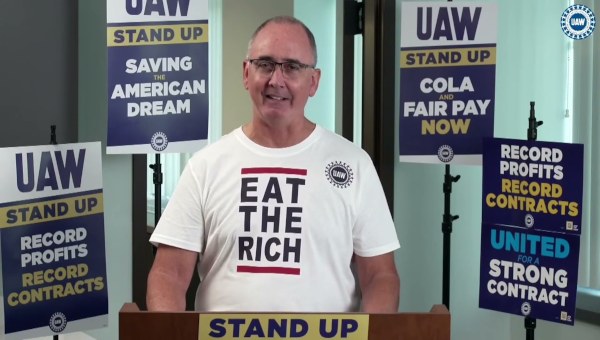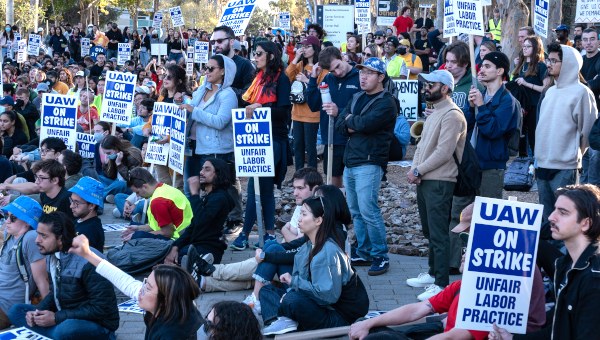Solidarity with UAW Strikers
A lively crowd of Unifor Local 222 members and retirees came out Monday night, October 7, to show their solidarity with the workers who are taking on General Motors (GM) in the US.
Sean Crawford (UAW Local 598 – Flint Truck) and Frank Hammer (past President UAW Local 909 – Warren Transmission) made presentations about the battle that is being waged right now, and the rank-and-file determination to get rid of two tier agreements and win equality for temps. They also talked about the urgent need to convert GM plants to green sustainable production – mass transit, electric vehicles, wind turbines.
Recorded by Tony Leah at the Unifor Local 222 Hall, Oshawa, Ontario, 7 October 2019.
‘I can see this going another month’:
GM Workers say US Strike Could Last for a While Yet
Josh Rubin
After more than three weeks on the picket lines, Sean Crawford would much rather be back to work. But the veteran autoworker isn’t optimistic he’ll be back at the General Motors plant in Flint, Michigan, any time soon.
“I can see this going another month. They’re really playing hard ball,” said Crawford, en route to a rally and information session with Canadian auto workers and Unifor members, in Oshawa Monday.
The biggest sticking point is ending the two-tier wage structure agreed to by the United Auto Workers (UAW) union in previous contracts, said Crawford, as well as ensuring better security against jobs being contracted out. “It’s a matter of solidarity,” said Crawford.
The strike has already cost GM more than $1-billion, according to an estimate from Morgan Stanley, and things aren’t getting any more cheerful at the negotiating table. The company quickly shot down a union proposal over the weekend and there are fears the strike could drag on for a while yet – which would continue to depress revenue for Canadian auto parts suppliers.
Meanwhile, workers in the US are collecting just $250 per week in strike pay, which amounts to only about 20 per cent of a typical regular paycheque. That’s tough enough for workers to deal with, Crawford said, but losing health benefits during the strike is an even bigger concern.
“Because we don’t have a government-funded healthcare system, that’s a big deal. People are going to get sick and die because of that. And some people aren’t going to be able to afford their mortgages,” said Crawford.
A letter to members from United Auto Workers vice-president Terry Dittes also casts doubt on whether there will be a quick settlement in the dispute, which sent 49,000 workers to the picket lines on Sept. 16, crippling GM’s factories. In the letter, Dittes complained that GM’s most recent proposal did nothing to address a host of items, in particular job security for members during the term of the four-year contract.
Normally in contract talks, the union bargains for commitments from the company to build new vehicles, engines, transmissions and other items at US factories represented by the union.
Our Labour is Making Record Profits for GM
“It did nothing to provide job security during the term of this agreement,” Dittes wrote. “We, in this union, could not be more disappointed with General Motors who refuse to recognize the experience and talent of our membership.”
A person briefed on the talks said Sunday that the union also voiced concerns about GM increasing production in Mexico, where it now builds pickup trucks, small cars and two SUVs. The person, who spoke on condition of anonymity because the talks are private, said both sides are far apart on guarantees of new products in US factories.
In a statement, GM said it continues to negotiate in good faith “with very good proposals that benefit employees today and builds a stronger future for all of us.” The company said it is committed to talking around the clock to resolve the dispute.
GM’s US factories have been shut down since the workers walked out Sept. 16. Parts shortages have forced the company to close plants in Mexico and Canada, and the strike is hitting Canada’s automotive parts industry hard.
Scotiabank analyst Mark Neville slashed his third-quarter profit estimates for Aurora-based Magna International and Vaughan-based Martinrea International Inc. by about 5.5 per cent in an Oct. 4 report.
Shares of Canada’s auto parts makers have slumped since the start of the US strike last month: Linamar has dropped 13 per cent, Martinrea lost 12 per cent and Magna fell 6 per cent.
Some industry watchers have also suggested smaller parts makers could be forced out of business altogether if the strike goes much longer, something Crawford regrets.
“I feel awful for the workers there. But GM is making record profits. And they owe their very existence to the Canadian and American governments and to the workers. So they should be sharing that,” said Crawford. •
This article first published on the Toronto Star website.





